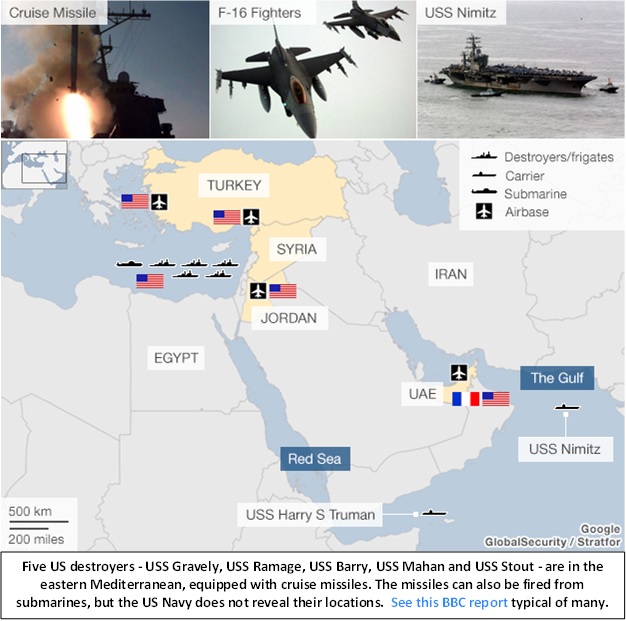Amb. Henry F. Cooper, Chairman . . . Lt. Gen. Daniel Graham, Founder
High Frontier . . Building Truly Effective Defenses . . Reagan’s Vision Lives
E-Mail Message 130903
The Hobgoblin of Little Minds?
By Ambassador Henry F. Cooper
September 3, 2013
For years, I misquoted Churchill as saying “Consistency is the hobgoblin of little minds” . . . He may have, but if he did he surely would have credited Ralph Waldo Emerson who wrote a century earlier, “A foolish consistency is the hobgoblin of little minds, adored by little statesmen, philosophers and divines” apparently to argue against too much consistency and for new thinking and self-reliance. Whatever . . . recent U.S. policies will never be criticized for being too consistent—except in their inconsistency.
I recently quoted KT McFarland on Fox Business News: “We were for Mubarak before we were against him; we were for Morsi before we were against him; and we were for General El-Sisi before we were against him.”
Would that our policies regarding Egypt were the only inconsistencies in our seemingly never-ending entanglement in the inscrutable Middle East and its centuries—even millennia—old conflicts between its families, tribes, states and alliances. These alliances include connections with the cacophony of proliferation that includes Russia, China, North Korea and others who at various times change their pragmatic views re. “the enemy of my enemy is my friend.”
And all these entanglements also involve the intersection of the conflict of our Judeo-Christian heritage and multiple strains of Islam at war with each other and uniformly hostile to our ideals of life, liberty and the pursuit of happiness.
There is no apparent answer to this dilemma, and especially to inform the current deliberations on next steps regarding Syria—given the numerous inconsistencies of our past and current (if anyone understands them) policies, public statements and naïve failed aspirations for an “Arab Spring” in the entire region.
Legacy of the Red Line Warning.
It is good that some of our representatives are returning to Washington to consider these issues, given the President’s belated request that they join in his decision to launch a limited strike on Syria in response to Syria’s (at least second) use of chemical weapons after his “Red Line” warning a year ago. But consider the swamp they are in as they try to find a sensible way forward from our current position illustrated by just a few of President Obama’s statements and actions.
- The President’s “Red Line” warning over a year ago threatening “enormous consequences” probably never made sense, but when no response followed Syria’s first use of Chemical Weapons months ago, his inaction set the stage for the current dilemma.
- The President’s announced intent to strike Syria, positioning armaments to do so, and days later deferring that announced attack while he consults with congress for a week or so eliminates most if not all elements of surprise our troops might have had—it is well known that Syria is to the extent possible taking counters to President Obama’s assurances of a “limited attack,” apparently on targets that cannot easily be shielded or moved.
- The President’s metaphor of a “shot across the bow” as the purpose of the attack only makes sense if he is prepared to “sink the ship” if his warning is not heeded—pray tell how does he intend to do that? Especially if he lives up to his companion promise of “no boots on the ground.”
- Claims that we must act now because of its horrific precedent are clearly exaggerated—Saddam Hussein used chemical weapons on his own people during the Iran-Iraq war—and killed an order of magnitude more people than Assad’s recent attacks—in full view of the international community without notable consequences beyond talk.
- By the way, many believe Hussein moved his weapons of mass destruction to Syria in the run-up to the 2003 second Gulf War—which would account for their absence after the war.
- While claiming Syria is a “danger to our national security,” the President did not even once mention Iran in Saturday’s speech—in my opinion, the single greatest Middle Eastern threat to U.S. national security, well on its way to gaining nuclear armed ballistic missiles that can reach U.S. territory—see below.
- Iran’s acquisition of the world’s most dangerous weapons of mass destruction, while leading state sponsors of terrorism, dwarfs the importance of Assad’s use of chemical weapons—and our and Israeli intelligence estimates suggest Iran is gaining a nuclear capability very soon.
The President’s spokesmen have the audacity to ask Congress about the message “we” will send if congress does not agree to go forward with whatever is his highly circumscribed attack on the Syrian regime. According to press accounts, the President’s proposed language to be considered by congress is more open-ended than the resolutions that set in motion the Vietnam War (1964) and our war in Iraq (2001).
The proposed language involves no end date and would give the President approval to use the military “as he determines to be necessary and appropriate in connection with chemical weapons or other weapons of mass destruction in the conflict in Syria.” And the President would be authorized to act “to prevent or deter the use or proliferation” of the weapon or to “protect the United States and its allies and partners” from the weapons.
The real question, in view of the mixed messages the President has already sent by his deeds and words: “Is there any way, in our national interest, to achieve a viable strategy from his paralysis and verbal scams?”
Turning to Congress now may seem like a brilliant political move to the President. If Congress votes yes—and it all turns out badly—as seems likely and as have most of his other initiatives in the Middle East, he will say we are all in this together. And if Congress votes no, he hopes still to be seen as a good guy for trying.
The greater problem is how this debacle can improve America’s perceived role as the free world’s leader. There are a number of Obama decisions on the use of U.S. armed forces that have turned out badly.
- Yes, Osama bin Laden is dead, but al Qaeda is certainly not on the run . . . indeed its strength grows daily—and what we are doing in Syria could strengthen its role.
- The President’s publicized withdrawal from Iraq is rescuing defeat from the jaws of victory as the violence there is worse now than when he came into office—and growing.
- The President’s announced withdrawal from Afghanistan will be welcomed by the Taliban.
- The President’s “lead from behind strategy” in Libya ended in failure and a debacle in Benghazi costing the lives of our Ambassador and three other Americans—which is still unexplained . . . and it does matter, regardless of the claims of then Secretary of State Hillary Clinton.
These acts and others show that President Obama has not learned his lessons very well. His Saturday speech just makes his shortfalls as commander-in-chief even more glaringly apparent. America’s apparent weakness is dangerous. Putin mocks our President and Beijing ignores him.
In thinking about notable inconsistencies, recall that several former senators, now senior officials in the Obama administration, have changed their previously outspoken views on dealing with the Assad regime. As pointed out by Rowan Scarborough’s article in today’s Washington Times, Former Senators Kerry, Hagel, and Biden opposed President George W. Bush’s “get tough” efforts to counter Assad’s brutal dealings with the people of Syria and his ties to Hezbollah and Hamas—terrorist groups with known links to Iran—and al Qaeda. Perhaps most notably, Secretary of State John Kerry now calls Assad “a thug and a murderer” . . . back then, as Chairman of the Senate Foreign Relations Committee, he applauded Assad for being “very generous” and argued he would change for the better.
In any case, we should not play “the enemy of my enemy is my friend” game in the Middle East . . . where we have but one true friend—the only democracy in the Middle East, Israel. Prime Minister Benjamin Netanyahu will employ whatever forces he can to underwrite the Red Line he has drawn on Iran’s nuclear program. We should be standing with him. Yet, the President’s dealings with Israel have been lukewarm at best.
And, while congress deliberates on these and related important considerations before they officially return next week from their August recess, President Obama is headed to the 5-6 September G-20 Summit in St. Petersburg, hosted by that former KGB agent and again Russian President, Vladimir Putin—who in 2005 said “the demise of the Soviet Union was the greatest geopolitical catastrophe of the century.” Beware the meetings on the margins.
Putin, of course, sides with Assad in Syria and with Rouhani in Iran against U.S. interests. Wonder what’s new of President Obama’s pre-election promise of “flexibility” on negotiating away our missile defense interests he is willing to trade for help on Syria and other possible “reset” ideas. Some of these “reset” issues that may arise in St. Petersburg were discussed by Steven Blank last Tuesday—before Syria distracted Washington’s interests in things strategic.
China, Russia’s partner in blocking any help from the United Nations via their joint veto power, will also be there to “help” President Obama find solutions, of course. Among the “hobgoblin of little minds.”
Meanwhile, the clock ticks on—to the first anniversary of Benghazi and the twelfth anniversary of 9/11. Wonder what will happen this year?
Distractions from the Looming Danger from Iran.
We should assure we can respond to the growing existential threat from Iran. Israeli Prime Minister Benjamin Netanyahu’s “Red Line,” when Iran gets enough critical nuclear material to build nuclear weapons, is urgently important for Israel and the United States. The Israelis are preparing to deal with this threat, though they don’t discuss how—especially how they might preempt Iran’s getting nuclear weapons. But it is well known that they also have been diligently building ballistic missile defense systems that could intercept ballistic missiles, including from Iran.
The U.S. should follow suit—as quickly as possible. If/when Iran gets nuclear weapons and can mate them to ballistic missiles that they already have, they will pose an existential threat to the United States in any of the following ways:
- Nuclear-armed ICBM attacks over the North Pole—we need to strengthen our current defenses, especially for the Eastern Seaboard; congress is aware of this problem and pressing for improvements.
- Nuclear-armed satellite attacks over the South Pole—we are vulnerable to this mode of attack, which they may have practiced; and it appears to be being ignored.
- Nuclear-armed short, medium, or intermediate range missiles launched from vessels off our coasts—we are vulnerable to this mode of attack, but could employ Aegis ships normally near or on our coasts to provide limited defenses if we trained their crews to do so. Aegis Ashore sites, like those to be built in Romania and Poland, also could address this problem. The administration is supposed to address this issue next year in response to a congressional directive.
- Nuclear-armed short, medium or intermediate range missiles launched from the south—from the vessels in the Gulf of Mexico or from Latin America—and we are totally vulnerable and will require the deployment of effective defenses to counter such attacks. Aegis Ashore sites could provide this defense. The administration is also supposed to address this issue next year in response to the same congressional directive.
Any of these attack modes can detonate a nuclear weapon above the United States to create an electromagnetic pulse (EMP) that could cause irreparable damage to the key large transformers of the electric power grid—and under certain well known conditions that could cause a complete failure of the electric power grid for an indefinite period. The ultimate result anticipated by credible experts could be that the consequent chaos would lead to the death of several hundred million Americans within the following year.
It is very important to harden the electric power grid so that if an attacking missile gets through the defense and detonates its nuclear weapon high above the United States, we will not lose our electric power indefinitely. If we can accomplish this hardening of the electric power grid, then we will have a good chance of reinstating other critical infrastructure upon which our survival depends. Such hardening will also protect us against EMP from the solar storms. For a more complete summary of these issues, see our August 2nd email.
In addressing these concerns, it should be emphasized that the federal government’s first duty is to provide for the common defense. Providing effective missile defenses and hardening the electric power grid as quickly as possible should be a national priority.
High Frontier Plans.
We at High Frontier will continue to interact with the “hobgoblin of little minds,” by seeking to inform the powers that be of existential threats to the American people—as we have discussed in our emails for many months—and to urge them to “provide for the common defense” as charged by the Constitution they are sworn to uphold. Hopefully, key federal authorities and members of congress will soon begin to deal more effectively with this existential threat.
Key initiatives are to urge the Washington powers that be to undertake both the Shield Act and efforts to enhance our ballistic missile defenses, especially for our citizens on the East Coast and around the Gulf of Mexico, where they are completely vulnerable to ballistic missiles launched from vessels in the Gulf—or from Latin America, e.g., Venezuela.
But frankly, we have come to doubt that Washington will act in an expeditious way. Thus, we are also taking the message to grass roots America. Our local and state authorities need to understand these issues and what they might do if their federal representatives continue to fail “to provide for the common defense.”
It would be wise for other state legislatures to follow Maine’s initiative and harden the electric power grid in their states, while holding the Washington authorities accountable for their oath to provide for the common defense.
And what can you do?
Join us at High Frontier in seeking to alert the public and your local and state authorities to the existential threats posed by both man-made and natural EMP events—and what can be done about these threats.
We can use your help in spreading this information to the grass roots and to encourage all “powers that be” to provide for the common defense as they are sworn to do. Will you do your part?
Begin by passing this message to your friends and suggest they visit our webpage, www.highfrontier.org for more information. Also, please encourage your sphere of influence to sign up for our weekly e-newsletter!
Please click here to read Past Weekly Updates!
Please click here to read past Flash Messages!
Please help High Frontier continue this important and timely work!
Be sure to follow us on our Social Sites!
If you found this letter via our Social Sites, and you would like to subscribe, click below!







